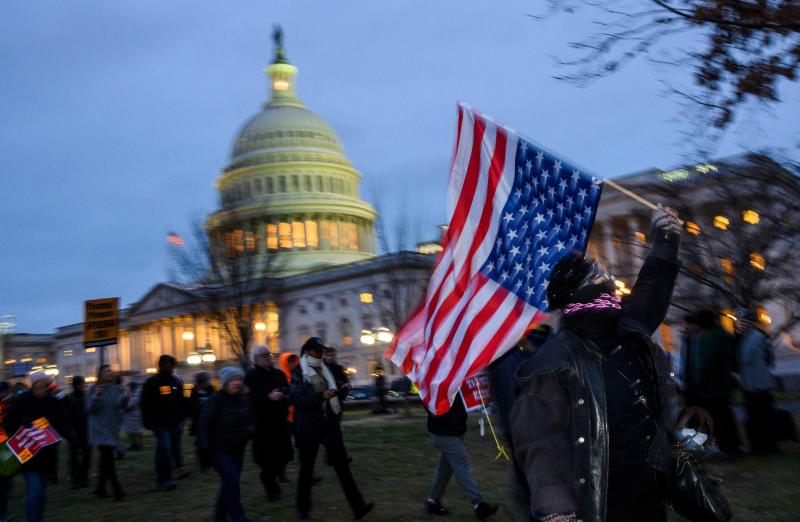US spy agencies move to counter foreign influence operations
Sign up now: Get ST's newsletters delivered to your inbox

A protester waves a US national flag upside down, in a sign of distress, outside the Capitol in Washington, DC, on Feb 5, 2020.
PHOTO: AFP
Follow topic:
WASHINGTON (BLOOMBERG) - The US is making countering attempts by foreign adversaries to undermine American democracy and weaken alliances a top intelligence priority on par with protecting critical infrastructure and stopping hacking attacks, according to a new national counterintelligence strategy.
The US is being increasingly targeted by rivals overseas, including Russia and China but also ideologically motivated groups, all of which have access to increasingly sophisticated tools from unmanned systems to biometric devices and advanced encryption, according to the strategy released Monday by the National Counterintelligence and Security Center.
Defending against foreign influence operations is now one of five strategic objectives for American intelligence agencies. The last strategy was issued in 2016, before US intelligence officials fully grasped Russia's sophisticated operation to interfere in the US election.
"Our adversaries regard deception or manipulation of the views of US citizens and policymakers to be an effective, inexpensive and low-risk method for achieving their strategic objectives," according to the 20-page strategy.
"These campaigns are designed, for example, to sway public opinion against US government policies or in favour of foreign agendas, influence and deceive key decision makers, alter public perceptions, and amplify conspiracy theories."
US agencies plan to strengthen partnerships with social media platforms and technology companies "to raise awareness of foreign influence activity, better understand the threat, and provide timely, substantive warning of foreign intentions to interfere with or influence US policy, officials, or the American public," it said.
Other objectives in the strategy are more traditional, such as protecting US critical infrastructure, defending against hacking operations from overseas, reducing threats to supply chains and countering economic exploitation.
The strategy calls for "a whole-of-society approach" that relies on coordinated actions by government agencies, the private sector and "active engagement of an informed public."
"Foreign threat actors have become more dangerous because, with ready access to advanced technology, they are threatening a broader range of targets at lower risk," according to the strategy.
More foreign adversaries also have been enabled by the public release of US intelligence cybersecurity tools, the document states. A group known as the Shadow Brokers, for example, leaked hacking tools apparently used by the National Security Agency in 2016 and 2017.
"The unauthorised disclosures of US cyber tools have enabled a wider range of actors to obtain sophisticated intelligence capabilities previously possessed only by well-financed intelligence services," according to the strategy.
The strategy also says adversaries might seek to disrupt critical infrastructure in order to force US policy decisions.
"Their efforts likely are aimed at influencing or coercing US decision makers in a time of crisis by holding critical infrastructure at risk of disruption," the document states.
"The decentralised and digital nature of critical infrastructure worldwide creates vulnerabilities that could be exploited by foreign intelligence entities, and they also are targeting the facilities and networks that underpin global energy and financial markets, telecommunications services, government functions and defense capabilities," according to the strategy.

